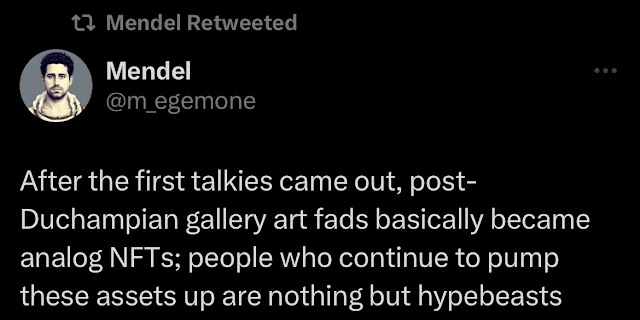This publication is a place for thoughtful discussion around writers’ work. Substack is also founded on the belief that writers and their work deserve respect.
We ask that writers keep conversations civil in the comments of this publication and other Substack spaces where we gather writers, such as events. That means respecting one other’s perspectives and life experiences in your conversations, and refraining from cruel or derogatory language. It is not a place for irrelevant rants or off-topic digressions.
As such we are disabling comments on this post. You can read more about our approach to the comments and community interactions in this publication here: https://on.substack.com/p/community-guidelines
These Community Guidelines only apply to spaces that we manage, like our company publications, events, and programs, and are completely separate and distinct from the Substack Content Guidelines, which outline what is and is not acceptable on the Substack platform as a whole as part of our hands-off approach to moderation that puts writers and readers in charge - https://on.substack.com/p/substacks-view-of-content-moderation.
RUDE
I had the good fortune earlier this week to be visited here in Rome by an ex-student who was brought up in Nigeria and has been working on a novel set there. I’ve only read the beginning of the book and have been unable to read more. (At the moment I can’t read much because I haven’t figured out how to scroll down though documents without the help of Isabella.) Anyhow, when the student had written a considerable amount of the book, she decided to show it not to an editor, friend, publisher or agent, but to a so-called ‘sensitivity reader’. She was concerned about whether her work would be politically correct or considered offensive to some or other reader; she was worrying about whether the book would even get past an agent, let alone to a publisher. This is a trend I’ve noticed with other students and also with editors at publishing houses: whether their work will be condemned for sexism, racism, cultural appropriation and so on. This is the contemporary anxiety for young writers today.
Some people are turned on and excited by the power of controlling others’ speech and freedoms. There is an element of the left which is bursting with aggressive self-righteousness and is puritanical and self-defeating. The writers I prefer, the ones I grew up with, are the wild ones, the demented ones, the rude ones who don’t give a damn. I can give some names and will present a mere handful: Shakespeare, Dostoevsky, Plath, Rhys, Celine, Burroughs, Miller, Baldwin. I could add many more and it would be a list of some of our greatest and most admired writers. They are artists who write without fear or inhibition; writers who may or may not be offensive to someone or other, writers who have been condemned or even prosecuted for their work. Think of what the great Salman Rushdie has been through in the name of free speech. The fatwah, in February 1989, was the first time I was aware that there could be real-life consequences for attacking tyrannous institutions and regimes. After the fatwah I know there were writers who were afraid to speak freely about the politicised version of Islam, or even about Muslims in general.
It has to be part of the writer’s job to be offensive, to blaspheme, to outrage and even to insult. I believe Kafka says in one of his notebooks that ‘Art should be an axe to smash the sea frozen inside us’. Art should not be safe or complacent; it should frighten, alarm and make us want to throw the book across the room. I don’t want to live in an atmosphere of fear and inhibition where writers are afraid of expressing their true selves for fear of offending someone or other. It is the work of great writers to turn the world upside down, to present opinions which go against the prevailing trends. It is not our job to please but to challenge, to make us think differently about our bodies our sexuality, politics and normativity.
Would these writers have passed the test today when it comes to political correctness? What would a ‘sensitivity reader’ have made of the work of D.H. Lawrence or William Burroughs? One of the things I’ve noticed about my students is that they are already inhibited. A student of mine wrote a good thriller from the point of view of a promiscuous American lesbian and was thoroughly criticised by his tutor for even thinking from this angle. How could he imagine for a moment that he was American, let alone a lesbian? The writer then got himself into a terrible tangle about who can write what and from which perspective. He re-wrote the book and made it much worse having been made to believe he was committing a literary crime by entering the mind of someone other than himself.
When I began my first novel, The Buddha of Suburbia, I was determined to write the book with as much disinhibition and freedom as possible. I would make it as dirty and funny as I felt my mind to be. I wouldn’t hold back or hesitate to say anything I truly felt. It wasn’t my job to deliberately shock but to tell the story in the most candid way.
Before this I can recall working on the script of My Beautiful Laundrette in the early Eighties with my friend the director Stephen Frears. Stephen is not keen on script development but his note to me when I began the rewrites was to make it ‘dirtier, outrageous and more shocking’. I felt liberated by his remarks and this script was the first thing I felt I had written in my own voice, something that was truly my own. I wonder with these early works of mine – My Beautiful Laundrette, Sammy and Rosie Get Laid, The Black Album and Intimacy – what a ‘sensitivity reader’ would have made of them and what butchery would have gone on; whether I would even have a career now. I’m relieved not to be a young writer today working in this atmosphere of self-consciousness and trepidation, this North Korea of the mind. The Buddha is full of racial insults and lewd, politically incorrect language, it being written from the point of view of a dirty minded seventeen-year-old mixed-race kid.
My youngest son, who is twenty-four, tells me of what an environment of apprehension and reserve he lives in when it comes to speaking and creativity. We should not forget that the insult can be an indication of friendship and admiration; that we call one another cunts and arseholes out of fondness rather than cruelty.
I believe this over-corrected behaviour has been created by the right to make us lefties and liberals seem foolish and petty with our silly disputes about language and point of view. The work of those of us in political opposition is not to fight amongst ourselves but to create a world in which there is no inequality or structural racism.
Our business is not to provide fuel to the right over minor disagreements but to continue as artists who are brave, bold and push the boundaries of what can be said and thought.
There's plenty to quibble with. Shakespeare never wrote "without fear or inhibition".
Kureishi misses the point, or actually two points. For the first, I'll use an example I'd forgotten about—not the de Maistre, which I've used often enough, but the source I used only once:
Andre Gide quotes Joseph de Maistre: "Whatever constricts man strengthens him." The context is a note on Calvinism and English literature. A few pages earlier he writesI believe that never did the "rules"' embarrass any genius, neither that of the unities in France nor that of the three actors in Greece, and that Racine and Corneille as well as Aeschylus have sufficiently proved this. (That moreover they have no absolute value and that any great genius masters them, whether be finds support in them or negates them - and that to come along and claim that this or that great man was embarrassed by them is just as ridiculous as if a painter said that when painting he is embarrassed by his frame and exclaimed: "Oh if only I could spread out a little farther!" and that those who protest against them are like Kant's dove, which thought it would fly better in a vacuum.)
In general insubordination with regard to the rules comes from an unintelligent subordination to realism, from a misunderstanding of the ends of art, from that specious insinuation of empiricism which aims, through a scandalous generalization, to scoff at art by attacking it only where it has become artifice, and to label as factitious all supernatural beauty.
The second point is clear in the words of the Substack censors above, who want to foster a polite, safe conversation, safe from the vulgarity of the street, and the real world of social and political life, and which they can bleed for profit. Kureishi is attacking individual passivity but not the forces that encourage it or in fact mandate it.
Cultures opening out and cultures closing down. The difference between renaissance and mannerism, or monarchism, democracy, and fascism. Iranian and Israeli film. I always have to repeat this shit.
Modern ideologies discount cultures as systems fostering stability and see them only as based on teleology: derogating means for ends. Democracy is as theatrical as monarchy. Fascist theater is something else entirely.
Science is the study of facts and philosophy the study of values. Conflating the two in favor of facts, values become assumed. Values assumed all questions are seen as those of expertise. Expertise as the goal terms of measurement are assumed. Curiosity is defined by the frame, values by the frame moral worth by the frame.
Democracy is undermined as a value and then as a goal.
I wrote that years ago. I was reminded of it a week ago reading Leiter
Scientists are useful people, but there is more to philosophy than being useful to science or solving "social problems," although I do think philosophy could do a lot more of the former, and has done almost none of the latter. Genuine philosophers are legislators of value, as one 19th-century German observed,..
He means Nietzsche, of course, who wasn't much for democracy.
Values are the product of the community, formed and reformed over time. High art has the relation of low art that haute cuisine has to generations of grandmothers. All of this for me goes back decades, but here 2008 will do: on the history of law, food, and beer. The absurdity of Fukuyama, Perry Anderson, and anyone who follows them, is that Schmitt and Kojève have the relation to Hegel that Shostakovich has to Beethoven. It's all riffing on the themes and structures of the past European tradition. But these assholes pretend, (and this continues from yesterday).
The history of events merely provides a series of pegs to hang the history of ideas on, and it is the latter that is of real interest. So, the time has come to turn to that history of ideas.
From the manuscript, posted here in 2015.
The history of modern intellectual life, more even than the history of modernity itself, if it were to be written now would need to need to be written by a historian from Mars, someone so far removed from the events of the past century that their biases are wholly other. Objectivity does not exist; the sociological history of the present describes the present no more than cognitive science describes the mind. You can’t pretend to describe yourself and call it science. Skinner was right to call cognitive science “the creation science of psychology”. There’s no scientific study of ideas as ideas; there’s no scientific study of metaphysics. They’re what we are as persons, as people with experiences, desires, and names. Once you’ve acknowledged yourself as “Rudolf Carnap” any hope of the end of metaphysics is gone. It was never there to begin with.
But this is perfect: "the authentic world of the Bildungsbürgertum". von Karajan at the Machine:


















